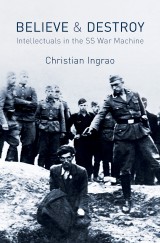Details

Believe and Destroy
Intellectuals in the SS War Machine1. Aufl.
|
15,99 € |
|
| Verlag: | Wiley |
| Format: | EPUB |
| Veröffentl.: | 11.07.2013 |
| ISBN/EAN: | 9780745670041 |
| Sprache: | englisch |
| Anzahl Seiten: | 432 |
DRM-geschütztes eBook, Sie benötigen z.B. Adobe Digital Editions und eine Adobe ID zum Lesen.
Beschreibungen
There were eighty of them. They were young, clever and cultivated; they were barely in their thirties when Adolf Hitler came to power. Their university studies in law, economics, linguistics, philosophy and history marked them out for brilliant careers. They chose to join the repressive bodies of the Third Reich, especially the Security Service (SD) and the Nazi Party’s elite protection unit, the SS. They theorized and planned the extermination of twenty million individuals of allegedly ‘inferior’ races. Most of them became members of the paramilitary death squads known as Einsatzgruppen and participated in the slaughter of over a million people. <br /> <br /> Based on extensive archival research, Christian Ingrao tells the gripping story of these children of the Great War, focusing on the networks of fellow activists, academics and friends in which they moved, studying the way in which they envisaged war and the ‘world of enemies’ which, in their view, threatened them. The mechanisms of their political commitment are revealed, and their roles in Nazism and mass murder. Thanks to this pioneering study, we can now understand how these men came to believe what they did, and how these beliefs became so destructive.<br /> <br /> The history of Nazism, shows Ingrao, is also a history of beliefs in which a powerful military machine was interwoven with personal experiences, fervour, anguish, utopia and cruelty.
<p>Foreword</p> <p>Acknowledgments</p> <p>Glossary</p> <p><b>PART ONE: The young men of Germany</b></p> <p><b>Chapter 1: A 'world of enemies' (I)</b></p> <p>The outbreak of war</p> <p>The silence of the Akademiker</p> <p>The 'time of troubles': an experience of war?</p> <p><b>Chapter 2: Constructing networks</b></p> <p>Places to study</p> <p>Places of association</p> <p>Networks of solidarity</p> <p><b>Chapter 3: Activist intellectuals</b></p> <p>The construction of academic knowledge</p> <p>Knowledge and activism (1919-1933)</p> <p>'Combative science' and SS intellectuals in the Third Reich</p> <p>The shadow of the Great War</p> <p><b>PART TWO: Joining the Nazis: a commitment</b></p> <p><b>Chapter 4: Being a Nazi</b></p> <p>The foundations of the doctrine</p> <p>The origins of Nazi fervour: planning a sociobiological</p> <p>re-establishment</p> <p>The appropriation of a system of beliefs</p> <p><b>Chapter 5: Entering the SD</b></p> <p>Whether to enter the Party or not?</p> <p>Towards the SD: Nazi careers</p> <p>Recruitment: a social mechanism of enlistenment</p> <p><b>Chapter 6: From struggle to control</b></p> <p>From the 'Security Department of the SS' (SD) to</p> <p>the 'Reich Security Main Office' (RSHA)</p> <p>A 'world of enemies' (II)</p> <p>Control</p> <p><b>PART THREE : Nazism and violence: the culmination 1939-1945</b></p> <p><b>Chapter 7: Thinking the east, between utopia and anxiety</b></p> <p>The curse of Germanic isolation</p> <p>The Nazi project for a sociobiological re-establishment</p> <p>Redevelop and settle: forms of Nazi fervour</p> <p><b>Chapter 8: Arguing for war: Nazi rhetoric</b></p> <p>From the reparative war to the 'Great Racial War'</p> <p>From the discourse of security to the discourse of genocide</p> <p>Expressing violence: defensive rhetorics, utopian rhetorics</p> <p><b>Chapter 9: Violence in action</b></p> <p>The experience of violence</p> <p>Demonstrative violence, violence of eradication</p> <p>A transgressive violence</p> <p>Violence as rite of initiation</p> <p><b>Chapter 10: SS intellectuals confronting defeat</b></p> <p>Defeat rendered unreal</p> <p>Finis Germaniae. The return of the old anxiety</p> <p>The denouement</p> <p><b>Chapter 11: SS intellectuals on trial</b></p> <p>Strategies of negation</p> <p>Strategies of evasion</p> <p>Strategies of justification: the Ohlendorf case</p> <p><b>Conclusion: Memory of war, activism and genocide</b></p> <p>Notes</p> <p>Sources and bibliography</p> <p>A piece of research and its context</p> <p>A specific conceptual framework</p> <p>List of archival collections consulted</p> <p>Printed sources</p> <p>Bibliography</p>
<p>"a thoughtful, well researched, and well written addition to the field of perpetrator studies—a work that illustrates convincingly the role of Germany’s “best and brightest” in the prosecution of genocide."<br /> <i><b>Holocaust and Genocide Studies<br /> </b></i><br /> "A chilling collective portrait of a generation blinded by the fervor of their ideology and oblivious to the suffering of others."<br /> <i><b>Wall Street Journal</b></i><br /> <br /> "Packed with useful information on this important Nazi cadre."<br /> <i><b>Standpoint</b></i><br /> <br /> "Presents gripping accounts of particular spectacles of violence and their role in imposing order."<br /> <i><b>Los Angeles Review of Books</b></i><br /> <br /> "With this quest for understanding in mind, Ingrao has undertaken what is clearly a mammoth historical task, and ultimately written an astonishingly profound and in-depth book on a subject that ought never be forgotten."<br /> <b><i>David Marx Book Reviews</i></b><br /> <br /> "This is an important and original study of ideology and experience rather than yet another catalogue of crime, and it therefore offers a different and powerful explanation for how educated men became perpetrators of mass murder."<br /> <b>Richard Evans, University of Cambridge</b><br /> <br /> "How did highly educated German intellectuals of a certain generation make themselves into believing Nazis, career-minded ideologues, and practitioners of terror? In compelling detail and in a manner consistent with the best accomplishments of recent scholarship, Christian Ingrao guides us astutely and assuredly through this shockingly normalized interior world."<br /> <b>Geoffrey Eley, University of Michigan</b></p>
<p><b>Christian Ingrao</b> is the director of the Institut de l'histoire du temps présent. A specialist in Nazism and war studies, he also teaches at Sciences-Po. His previous work, <i>Les Chasseurs Noirs</i>, was an international success.</p>

















